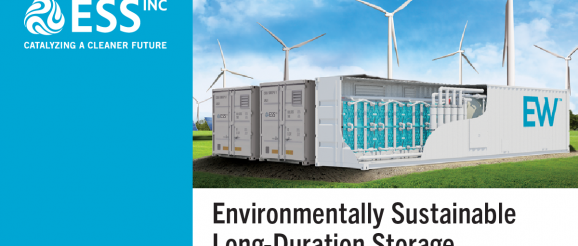Made in America: Catalyzing the Clean Energy Future with American Innovation and Manufacturing | By Chris Montgomery, VP of Supply Chain | ESS, Inc.

At ESS, we’re catalyzing the clean energy future with American-made Iron Flow Battery (IFB) technology which provides long-duration energy storage to deliver clean power even when the sun is not shining and the wind is not blowing. As the world transitions to wind and solar power, one of the biggest challenges will be the inherent intermittency of those resources; there is growing awareness that energy storage will be necessary to ensure a reliable, resilient energy system. Look no further than a recent headline in The Economist: Decarbonisation of electric grids reliant on renewables requires long-duration energy storage.
The good news is that ESS is manufacturing a solution to this challenge and we’re doing it right here in Wilsonville, Oregon, leveraging an American supply chain that creates jobs and delivers value to communities nationwide. 80% of the components required to manufacture an ESS IFB are sourced domestically, and many of them can be purchased at your local hardware store. And, the electrolyte used in ESS IFBs is simple: just iron, salt and water, materials which can be sourced almost anywhere on Earth.
The ability to leverage diverse supply chains is a significant advantage of IFB technology. As society transitions to clean energy, we should apply lessons learned from past energy crises to build a system that is resilient and secure. Russia’s invasion of Ukraine and the associated shocks to global oil markets illustrated the risks posed by overreliance upon narrow energy supply chains, particularly if those supply chains are dominated by unreliable parties.
Clean energy technology is not inherently immune from these risks. Today, the dominant technology in the energy storage space is lithium-ion, the battery technology that powers your cell phone or electric vehicle. These batteries are energy dense, which makes them ideal for mobile applications. But, when it comes to grid-scale infrastructure, they have some significant drawbacks. Risk of fire, loss of capacity over time, and a supply chain reliant upon critical minerals introduce risks into a system dependent upon lithium-ion technology.
On the last point, lithium-ion batteries require numerous minerals, including cobalt, nickel, manganese, lithium and graphite. Production of these materials is highly concentrated in a few countries. For example, in 2021, China produced an estimated 82% of the world’s natural graphite and the Democratic Republic of the Congo produced 70% of the world’s mined cobalt. Reliance upon a supply chain that runs through geopolitically challenging regions makes lithium batteries an unreliable foundation on which to build America’s clean energy infrastructure.
The U.S. Department of Energy agrees. In its recent report on key strategies to secure America’s energy supply chain, DOE anticipates significant growth in technologies that do not require scarce minerals, such as flow batteries. They go on to say that “The developing U.S. flow battery industry has several advantages, including access to the raw materials and simpler production processes…and the United States is in a good position in that there are several domestic flow battery technology developers and vendors.”
Last week, as we took some time to celebrate the 4th of July, I found myself reflecting on the American spirit of innovation and drive that led us to declare independence and form the first, however imperfect, modern democracy 246 years ago. This spirit is still alive today as American industry tackles the world’s biggest challenges. At ESS, we are proud to play a part in creating a better, cleaner future. And we’re proud to build that future right here in the United States.
